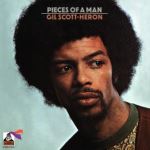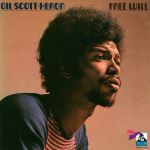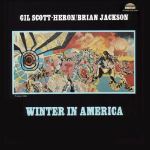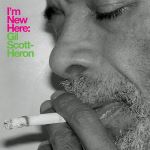And so we start another week of Morning Music. I’ve been reading, Gil Scott-Heron: Pieces of a Man. So I thought we ought to feature him. He was an amazing talent. He died far too young. And he spent far too much time otherwise engaged, releasing no work. Still he left the world a great deal of work: 13 studio albums.
Given that he isn’t that well known, I think we should start with his breakout song, “The Revolution Will Not Be Televised” off his first album, Small Talk at 125th and Lenox. I first heard it when I was in my very late teens, working graveyard as a baker. It blew my mind. For one thing, I had long been interested in a kind of chanting or talk singing. And I had long been told by people that you just couldn’t do that. Well, here was someone doing that and it was electrifying.
Note a couple of things about this. First, not all his work is like this. He was quite varied. Much of his music is very jazzy, as the song I’m going to feature tomorrow off his next album. Second, this is the original version. If you want to hear his recording of the song with a full band, it is on YouTube. I prefer this one:
Cover of “Gil Scott-Heron: Pieces of a Man” licensed under fair use.
Pieces of a Man
Today we listen to the title track of Pieces of a Man. Gil Scott-Heron wrote it with jazz composer Brian Jackson — who he would do some of his best work with.
The song is the perfect combination of music and lyrics. It sounds like a jazz standard with lots of major 7th chords. It is highly evocative, even as it tells a fairly concrete story about a man destroyed by his economic difficulties. In particular, it highlights the importance of having a paying job to a man’s self-esteem. “He was a good man and a strong man, yet he went to pieces.”
I especially like the line, “And for some unknown reason, he never turned my way.” I know that experience. Men of that generation did not like to cry. But this feeling was especially true when it came to crying in front of their sons. They felt like they had to be strong for their sons. Although as this song indicates (but it is not autobiographical), sons still saw their fathers as strong. Regardless, that’s such a wonderful way of rendering the scene — explaining exactly what was happening with very few words.
“PiecesOfaMan cover” by Source. Licensed under Fair use via Wikipedia.
Poetry: Pieces of a Man
Jagged jigsaw pieces
Tossed about the room,
I saw my grandma sweeping
With her old straw broom.
But she didn’t know what she was doing.
She could hardly understand,
That she was really sweeping up
Pieces of a man.
I saw my daddy meet the mailman.
And I heard the mailman say,
“Now don’t you take this letter to hard now Jimmy,
Cause they’ve laid off nine others today.”
But he didn’t know what he was saying.
He could hardly understand
That he was only talking to
Pieces of a man.
I saw the thunder and heard the lightning,
And felt the burden of his shame.
And for some unknown reason,
He never turned my way!
Pieces of that letter
Were tossed about that room.
And now I hear the sound of sirens
Come knifing through the gloom.
But they don’t know what they are doing.
They could hardly understand
That they’re only arresting
Pieces of a man.
I saw him go to pieces!
I saw him go to pieces!
He was always such a good man!
He was always such a strong, strong man!
Yeah, I saw him go to pieces.
I saw him go to pieces.
—Gil Scott-Heron
Pieces of a Man
The Get Out of the Ghetto Blues
We will slide smoothly into Gil Scott-Heron’s third album, Free Will. I’m making no effort to stay away from his better known tunes, because none of his work that that well know. And even people who have heard these tunes may not know who did them. Today, I feature, “The Get Out of the Ghetto Blues.”
One thing that was interesting about the black power movement was how self-critical it was. In that way, it was exactly what conservatives like David Brooks and Paul Ryan claim the African American community should be. (In my work with a local Baptist church, I can assure you that this never went away.) But, of course, white America was terrified of black power. And, of course, we aren’t just talking bigots in small town Mississippi. We are talking northern white suburbanites — most of whom did not consider themselves racists.
“The Get Out of the Ghetto Blues” is very simple. It’s about self-empowerment — by way of hectoring. It also has an awesome guitar part by David Spinozza.
“Free Will cover” by Source. Licensed under Fair use via Wikipedia.
Winter in America
In 1973, Gil Scott-Heron released what I think is generally considered his masterpiece, Winter in America. And that’s saying something, considering the amazing quality of his work throughout his career. And I really think you should take eight minutes to love yourself by listening to “H²Ogate Blues.” Get it? It is an amazing musically accompanied rap. It is intense and insightful. But what it reminds me of is Bob Dylan’s “Rainy Day Women #12 & 35,” because it is so clear that the musicians are having such a great time. It can’t help but cheer you up, and you don’t even have to think of Nixon and Vietnam. Although “Just how blind, America?” still cuts like a new razor.
But instead, let’s do a song that wasn’t on the original release of Winter in America: “Winter in America.” I’m sure it was meant to be on it. It was on his next album. And it has been on reissues. It starts with the line, “From the Indians who welcomed the pilgrims.” And I’m sure to most people, the response will be, “Yes, it probably did feel like winter in America in 1973.” But I think Scott-Heron is still right. Nothing has changed. It’s just that we are more delusional than we used to be. We pretend that we aren’t at war because we use machines to prop up our empire. Americans may not be dying, but I think it is pretty clear that America is dying.
“Four more years of that?!”
“Winter In America” by Source. Licensed under Fair use via Wikipedia.
I’m New Here
Forgive me. By definition, weeks only have seven days, and it is impossible to squeeze into that the whole career of someone as great as Gil Scott-Heron. So I’m just going to jump to his last album, I’m New Here. We’ll spend our last two days on it.
It is not even a half hour long, but it packs a punch. In one way, it is totally different from what he’d done before. There’s a lot more atmosphere. But fundamentally, it is another Gil Scott-Heron record — in many ways as good as anything he ever did.
Me And The Devil
What we’re going to listen to is a video of two works on that album. The first song is his amazing cover of Robert Johnson’s “Me and the Devil Blues.” I don’t really know what to say. You’ve got to hear it. It’s fantastic. And then, there is his song “Your Soul and Mine.” It is Scott-Heron reciting “The Vulture” off his first album, with atmospheric music underneath. “Standing in the ruins of another black man’s life…” The two songs go perfectly together:
“Imnewhere” by Source. Licensed under Fair use via Wikipedia.
New York Is Killing Me
I’m New Here is probably Gil Scott-Heron’s most personal album. Or at least it feels that way. A friend mentioned that it was interesting that he should fall into the very trap of drug addiction and jail that he preached against. But I noted that this is actually a misreading of his work. Any hectoring that he did was loving. His real attacks were against the system that destroyed people. The fact that the system, to some extent, destroyed him almost seems appropriate to me.
The good thing about it is that he was able to write from both sides of it. For example, “The Crutch” presents what I think of as a very knowing portrait of a heroin addict, even though that was not his drug of choice. But I want to share with you a very raw blues number, “New York Is Killing Me.” It is both personal and social. And it is eternal. I am apparently not the only one to think that, because there are a lot of derivative songs based on it. But here is the album cut:
Gil Scott-Heroin 1990
We come to the end of our week of Gil Scott-Heron, and as usual, I’ve chosen a live set for this Saturday. I had a hard time choosing. The truth is that there are kind of two Gil Scott-Herons. There’s the young firebrand. Then there is the older and wiser man. Being older and wiser myself, I identify much more with the latter. But it is often great to spend time with the firebrand. It doesn’t really matter. I love it all.
The big problem is that I can’t find any live performances that are really late. They are more in the late 1990s and early 2000s when he was struggling. These performances make me a bit sad, even though they are still very good. This is the third time I’m posting a live performance. They keep being taken down. It’s from 1990.
Cover of “Gil Scott-Heron: Pieces of a Man” licensed under Fair Use.
Popcorn, Bottle, and Gil Scott-Heron
 Many of you may know of my fondness for Gil Scott-Heron and his funky proto-rap. I remember the first time I heard him, I was working as a baker in my late teens. The one nice thing about that job was that I was alone and so I could listen to the local alternative radio station. And on came “The Revolution Will Not Be Televised.” It was a revelation, “The revolution will not give your mouth sex appeal… The revolution will not make you look five pounds thinner because the revolution will not be televised.”
Many of you may know of my fondness for Gil Scott-Heron and his funky proto-rap. I remember the first time I heard him, I was working as a baker in my late teens. The one nice thing about that job was that I was alone and so I could listen to the local alternative radio station. And on came “The Revolution Will Not Be Televised.” It was a revelation, “The revolution will not give your mouth sex appeal… The revolution will not make you look five pounds thinner because the revolution will not be televised.”
Earlier today, my friend (and sometimes writer for this site) Will sent me a link to Scott-Heron’s song “The Bottle” with a note, “Doesn’t the bass line sound like corn popping?” I had to admit that it did. But going back over a lot of his work, that’s more generally true. That’s part of what makes his work funky. There is no funk guitar, so it all comes down to the bass and the percussion. But the bass on “The Bottle” does sound more like a popcorn machine than any other song I’ve heard.
The song itself is deadly serious despite a really catchy tune and pleasant production. It’s about hopeless people who find their only solace in alcohol. It could be anything though. The bridge is slightly different each time, but the lyrics are:
Don’t you think it’s a crime
The way, time after time
Friends of mine
In the bottle
There’s people sure ‘nough
In the bottle
But the song offers no solutions, and not even much in the way of context. Maybe in the three years between “The Revolution Will Not Be Televised” and “The Bottle,” Scott-Heron had become a bit more cynical. I don’t actually think so. But it is certainly true that Small Talk at 125th and Lenox with “Revolution” and “Whitey on the Moon” is more strident than Winter in America. I prefer the former, but musically the latter is better.
Anyway, here is “The Bottle”:
Conclusion
Gil Scott-Heron was one of the rarest of things: an idiosyncratic artist who was incredibly skilled. Every time I’m forced to listen to some American Idol screetcher, I’m reminded of the authentic beauty of Gil Scott-Heron’s work. In a way, I think of him as our Jacques Brel. But his work is so much more relevant to my life. I wish he were still alive. He’d only be 68 as I write this. It would be a different thing if his last album was weak, but it was some of his strongest work. He had so much more to offer us.
But I am extremely grateful for the work that he did leave to us. And I recommend that you check him out. There is lots of his work on YouTube. And you can still buy his albums at Amazon or your local record store. Listening to Gil Scott-Heron is one of the greatest gifts you can give yourself!
Featured image cropped from Gil Scott-Heron yy mikael altemark.It is licensed under CC BY 2.0.












I’m going to risk outing myself as a full-on racist, here: I hate modern Black culture.
It’s not a “culture of poverty.” It’s a culture of defeat. And I can’t stand it.
A Black co-worker responded to the Minneapolis cops shooting an guy for no reason with appropriate horror. Then proceeded to tell me how he disliked all the “Black Lives Matter” protesters; why weren’t they angry about “Black on Black” crime?
I was dumbfounded. I could talk about the cops (I’ve read books about the history of police criminality in Minnesota) and I can talk, a little bit, about racism, I need to be more aware how I’m poisoned by it.
“Black On Black,” I just have no clue how to respond to that.
If the “Black Lives Matter” movement fails, it fails for the same reason “Occupy Wall Street” failed; not enough concrete goals. And in this case, the goals are pretty damn clear — release the video of Minneapolis cops shooting a guy in the head, and fire those cops.
(BTW, “Occupy” did not fail. It didn’t change our economic system. But when Hurricane Sandy disabled New York, the Occupy people saved the lives of thousands in nursing homes and group homes. That wasn’t what the Occupy people set out to do. When the shit hit the fan, they had each others’ phone numbers, and they collaborated to save lives. This wouldn’t have happened if they hadn’t met each other during Occupy Wall Street. And, by that measure, Black Lives Matter is not a failure no matter what it currently fails to accomplish.)
I see much of modern Black culture in the way I see redneck culture; we’re proud of how they hate us. Don’t stand up for yourself, don’t fight against employers and landlords and cops, instead, make a religion out of cultural signifiers that show you’re on the right losing team.
Jesus blistering Christ.
The great thing about Scott-Heron is his message sounds so radical now, but it’s not. He wants equality. He wants an end to being treated like a second-class citizen.
When and why did we lose this? How did righteous anger get turned into the cultural signifiers of poor people?
James! You are making gross generalizations. You cannot compare black culture with redneck culture. Blackness is something that society forces on certain people that look a certain way. It is equivalent to white culture and every bit as diverse. Redneck culture is akin to, I don’t know, “gangsta” culture? Black and white cultures are ecosystems. Scott-Heron is very much alive in the music of today. I’m just not up on it. But certainly Public Enemy is completely in that tradition. And I think that Black Lives Matter has been hugely successful in pushing race into the political discussion of the Democratic Party. Also: it hasn’t been around long.
You’re just angry at your conservative co-worker. I get that. But the truth is that you critique of a “culture of defeat” can be generally applied to the American working class.
Yes — I knew I was being a shithead as I typed it. I use comment threads on blogs to work out ideas. I participate in exactly two blogs, and I apologize for being dumb on each.
I don’t think I’m wrong in toto. Redneck culture is vastly more harmful, as it has more power. I do think Black culture has thrown away activism, the same way rednecks have thrown away unions. That’s not the same in very crucial ways. It is the same in some other ways.
These are gross generalizations. I see poor people as having, basically. given up. BlackLivesMatter and Occupy are nice stabs in the darkness, most poor people don’t know they existed.
I’ll see if I can delete this thread. If not, be gracious enough to do it for me.
I think the Black Lives Matter coalition is being much more successful than Occupy Wall Street since its goals are much more concrete and can be obtained:
1. Police departments are adding body cams. It won’t stop every asshole cop but it will mean that there is a record of it even if that record is tampered with.
2. Police officers are being charged. They probably won’t be found guilty in most cases but they will be found guilty in some.
3. Police officers are being fired for being corrupt. And it is sticking in many cases even though too many cops are being fired without due process-they get to have it too no matter how mad anyone is at them.
4. Civil Forfeiture is under attack finally and if they keep it up, it may actually be repealed. (I doubt it.)
5. There are politicians talking about making certain criminal offenses civil. And making it easier to get those civil fines taken care of-like how we now can use community service in lieu of fines here in AZ. Homeless Courts are being created.
There is quite a lot to be done but it is started. And that is something to be mildly hopeful about even if you disagree with some of the language and methods.
I am a huge snob about language and methods. When the Occupy Wall Street people had Noam Chomsky visit, they delivered their ridiculous “mic check!” mantra, as if a Chomsky lecture could be passed on paragraph-by-paragraph to listeners way in the back.
“Mic Check” was pure bullshit “I’m more Occupy than you” chest-thumping. The real activists saved lives during a hurricane years later.
Glad to know you are making a difference in AZ. My cynical bastard self tends to doubt anything will matter, but dealing with civil fines is really a big issue and I hope you can make progress getting those changes enacted.
I am not. Language and methods are more or less irrelevant except when they cause people who want to help you to be scared off. Tone matters a bit when trying to get reluctant people to help but only up to a point.
And this is why I cannot function in political offices doing good things. The self-righteousness makes me batty. They are doing important work. Thire language and methods completely make me recoil.
Also I hate doing cold calls to voters, which is pretty much the function of volunteers in political offices. “Hi! Are you so old you actually answer the phone, thinking it might be a neighbor? Surprise! It’s a political telemarketer!” Click as the phone hangs up, and repeat another 500 times in a row.
Politics is hard work and I’m not suited for it.
And where I’m being more than my usual moronic self is attributing “culture” to any group of people. There are wonderful rednecks who resent the modern GOP.
What a fucking dingbat, but I’ve done it before.
Oh, you were just ranting. I do a couple thousand words of that every day! Don’t fret it.